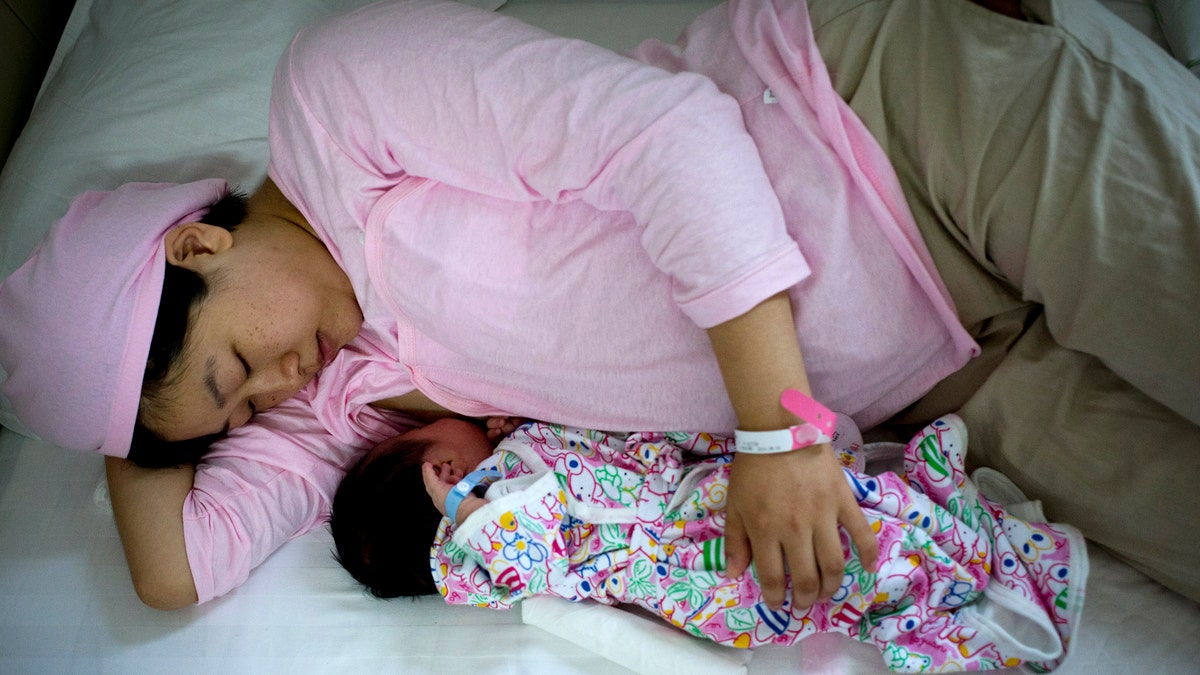
New mother Qi Wenjuan breastfeeds her 1-day-old son at Tiantan Hospital's maternity ward in Beijing, China. (AP Photo/Andy Wong)
That breastfeeding can provide a slew of health benefits for babies and their mothers isn’t news, but for the first time, international scientists have put a dollar amount on that benefit.
In comprehensive papers published Thursday in The Lancet Breastfeeding Series, scientists discerned that globally, the cost of lower intelligence linked with the decision not to breastfeed equated to about $300 billion annually— a number similar to the value of the global pharmaceutical industry.
Authors wrote that while the health benefits of breastfeeding may be well known in developed countries, mothers in poorer countries are actually likelier than those in rich countries to breastfeed their children.
"Supporting breastfeeding makes economic sense for rich and poor countries, and this latest breastfeeding study proves it," Series co-lead Dr. Cesar Victora, an emeritus professor from the International Center for Equity in Health, Post-Graduate Programme in Epidemiology, Federal University of Pelotas in Brazil, said in a news release.
Limited or nonexistent maternity leave had a direct impact on a mother’s decision to breastfeed, and the growing market of breast milk substitutes has also contributed to mothers’ choices, the series found.
Study authors noted that about 820,000 child deaths—about 13 percent of all deaths of children under age 5— could be prevented each year by improving breastfeeding rates.
The series involved studying the benefits, determinants and trends in breastfeeding from 28 systematic reviews, 22 specially commissioned meta-analyses and more than 1,300 studies. Authors calculated the costing data by analyzing a 2015 meta-analysis that suggested longer breastfeeding is linked with higher performance on cognitive tests among children and adolescents. Researchers found that those children who had higher performances had an average of three IQ points higher than those who performed worse. That effect translated to better academic performance, greater long-term earnings and improved productivity, according to the release.
Health-wise, researchers found that greater rates of breastfeeding would prevent about half of all diarrhea episodes and one-third of respiratory infections. Authors also said that, for each of the first two years a mother breastfeeds throughout her life, she sees a 6 percent lower risk of breast cancer, as well as a reduced risk of ovarian cancer. Breastfeeding already helps prevent 20,000 breast cancer deaths each year, the authors noted, but increased rates could help prevent an additional 20,000 deaths linked with the disease.
"Breastfeeding is a powerful and unique intervention that benefits mothers and children, yet breastfeeding rates are not improving as we would like them to— and in some countries, are declining," Victora said in the release.
Breastfeeding rates at 12 months in the U.S. were about 27 percent in 2011, according to the most recent data available, which was included in a 2014 report by the Centers for Disease Control and Prevention (CDC). In 2011, 79 percent of infants were breastfed immediately after they were born, and 49 percent were breastfed at 6 months.
In the United Kingdom, Ireland and Denmark, rates are even lower than those in the U.S. at 12 months: Only 1, 2 and 3 percent of children, respectively, are breastfeed at that age. Those are some of the lowest breastfeeding rates in the world, the series authors noted.
Series authors concluded that if breastfeeding rates in the U.S., China and Brazil increased to 90 percent, and if rates in the U.K. increased to 45 percent, treatment costs for common childhood illnesses would save at least $2.45 billion in the U.S., $29.5 million in the U.K., $223.6 million in China, and $6.0 million in Brazil.
"We hope the scientific evidence amassed in this Series will help revert these negative trends," Victora said, "and create a healthier society for everyone— mother, child, poor and rich."